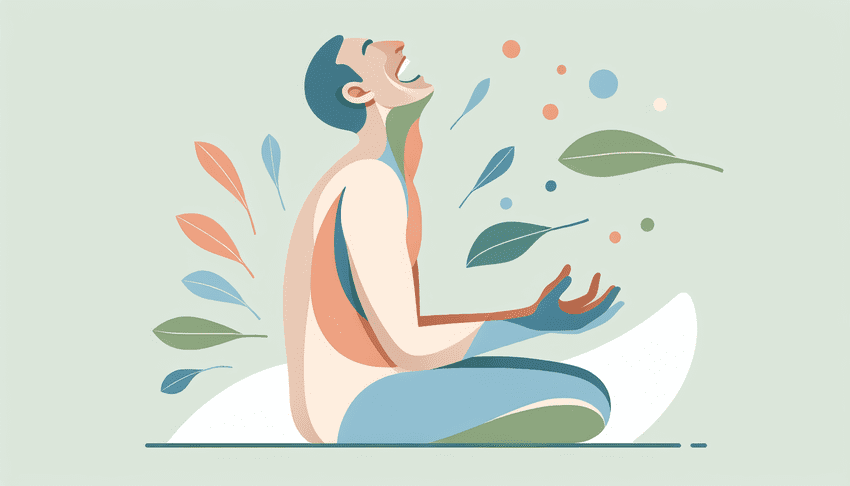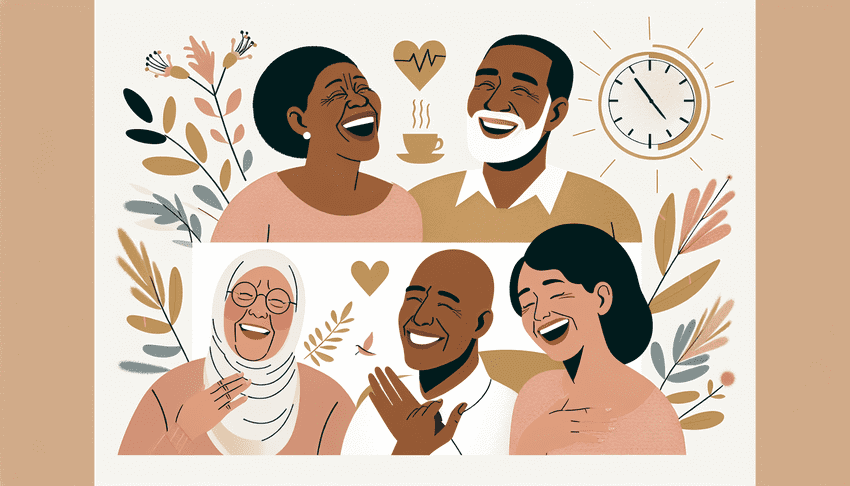Table of Contents
The Ripple Effect of Laughter on Mental Wellbeing

Laughter as a Social Glue
Laughter Therapy, an intriguing approach within Positive Psychology and Happiness realms, has immense power not only to heal the individual but also to bind people together. As we dive into the multifaceted benefits of laughter, it’s essential to understand how it functions as a social glue, reinforcing relationships and cultivating a profound sense of community.
Laughter’s Power to Connect
Laughter is a universal language, transcending cultural and linguistic barriers. It’s an explosive expression of joy, a silent acknowledgment of amusement, and an irresistible ripple that draws people closer. But its role goes beyond a mere reaction to humor. Shared laughter acts as a potent catalyst for building trust and fostering cooperation among individuals.
- Studies have shown that when people laugh together, their bodies release endorphins—natural feel-good chemicals that enhance social bonds and trust. This biochemical reaction can turn mere acquaintances into friends, strengthening the fabric of social networks.
- Laughter Therapy helps to break down walls of formality and apprehension that often keep people at arm’s length from one another. In workplaces, for instance, laughter can become the bridge to overcome hierarchy barriers, promoting a more cohesive and amiable work environment.
- Therapeutic group laughter sessions, often part of Laughter Therapy protocols, have notable effects in community settings. Here, the collective experience of laughing is a pathway to creating a shared language of empathy and cooperation, significantly enhancing interpersonal connections.
Real-world applications of Laughter Therapy reveal its profound effect on social dynamics. Take, for example, senior living communities where loneliness can be prevalent. Introducing regular laughter sessions has been observed to increase engagement and interaction among residents, forging companionship and a palpable sense of belonging.
Laughter as a Tool for Emotional Synchronization
The psychological underpinnings of laughter highlight an intriguing aspect: emotional contagion. When we see and hear others laugh, we are more likely to join in, due to the mirroring neurons in our brain that facilitate empathy. This mirroring effect aligns our emotional states with those around us, reinforcing camaraderie and shared experiences.
However, the transformative power of laughter extends beyond mere emotion. Laughter Therapy is built on the premise that sustained shared laughter can promote an alignment of goals, perspectives, and efforts among group members. This alignment proves indispensable in tackling collaborative endeavors, be it in community projects, team sports, or corporate strategies.
To summarize, Laughter Therapy is not only a tool for individual happiness but also a precious adhesive for social structures. It forges a path for people to connect, empathize, and work together towards common objectives. Embracing laughter in our daily lives, we can foster healthier, more supportive communities, proving that sometimes, laughter truly is the best medicine.
In our pursuit of personal development and happiness, let us not forget the communal essence of laughter, and how it can profoundly impact our relationships and collective well-being. Whether in our homes, workplaces, or broader communities, Laughter Therapy holds an irreplaceable role in weaving the tapestry of human connection.
Laughter’s Role in Social Bonding and Emotional Intelligence
Laughter, often deemed as the best medicine, plays a pivotal role in the intricacies of social bonding and the development of Emotional Intelligence. This joyous expression serves as a universal language, capable of bridging gaps, enhancing connections, and fostering an environment conducive to emotional growth.
The Significance of Laughter in Social Interactions
Laughter Therapy and Joyful Living are not just phrases; they embody the essence of human connections. In social contexts, laughter acts as a social glue, bringing individuals together in shared amusement or joy. For instance, when a leader incorporates humor into a team meeting, they’re not merely sharing a joke, but weaving a thread of commonality that strengthens the fabric of the team. This shared laughter can break down barriers, diminish hierarchies, and promote open communication.
- Laughter is a display of vulnerability that signifies trust among group members.
- It is a nonverbal indicator that says, “We share this moment, we share this understanding.”
- Through laughter, people experience a momentary alignment of emotions, reinforcing group identity.
Laughter and Emotional Intelligence
When it comes to Emotional Intelligence, laughter is more than an involuntary response to humor. It’s an intricate part of recognizing, understanding, and managing emotions. Individuals adept at humor often showcase high levels of Emotional Intelligence—they understand the power of laughter in regulating their own emotions and nurturing those of others.
- Laughter is common in team-building exercises, precisely because it lowers defenses, making individuals more receptive to one another’s ideas and feelings.
- In moments of shared laughter, people are more likely to exhibit empathy, another cornerstone of Emotional Intelligence.
- Diving into Humor and Well-being, laughter has been shown to reduce stress, improving mental clarity and emotional resilience.
Practical Implications of Laughter in Everyday Life
Consider the last time you laughed heartily in a group. It’s likely the experience sticks out in your memory, serving as a warm reminder of connectedness. This is because Happiness Through Laughter is not just anecdotal; it’s backed by research showing that laughter promotes the release of endorphins, fostering positive feelings and social cohesion.
- Mental Health Benefits are substantial—laughter therapy and support groups focusing on laughter exercises have proven effective in elevating mood and improving social relationships.
- Laughter encourages openness, another trait aligned with Emotional Intelligence, as it signals a willingness to engage and be engaged by others.
- Laughter, particularly in challenging times, can be a powerful coping mechanism, allowing for a greater perspective and emotional balance.
In conclusion, laughter serves as a fundamental tool in enhancing both individual Emotional Intelligence and collective social bonds. The Mental Health Benefits derived from Joyful Living through laughter are compelling, as they profoundly impact our well-being and the quality of our interactions. By integrating laughter into our social frameworks, we lay the groundwork for more empathetic, understanding, and connected communities.
The Physiological and Psychological Harmony of Laughter

The Physiological and Psychological Harmony of Laughter
Laughter Therapy, a gem within the spectrum of Positive Psychology and Happiness, isn’t just about sharing a good joke; it’s a robust health tonic for our brain and body. As we traverse through life’s myriad challenges, it becomes essential to find respites that not only cushion our daily stresses but actively contribute to our well-being. So, let’s unravel how laughter, a simple yet powerful act, influences our physiological state.
Endorphin Release and Mood Enhancement Through the delightful act of laughter, our brains become engaged in a chemical ballet. Scientific evidence indicates that when we laugh, our brains ramp up the production of endorphins – those feel-good chemicals often associated with the ‘runner’s high.’ It’s like flipping a switch that lights up the reward centers of our brain, resulting in a surge of pleasure and a notable lift in mood. Consider the last time you laughed heartily; the buoyancy you felt wasn’t just in your spirits but was underlined by a neurochemical uplift.
- Reduction of Stress Hormones and Relaxation Response
- Improving Immunity and Health
- Laughter Therapy as a Social Glue
In moments of laughter, our bodies also participate in this cascade of positivity by dialing down the secretion of stress hormones such as cortisol and adrenaline. When we laugh, we don’t just feel happier; we are actively diffusing the ticking stress bomb within us. A study published in the ‘American Journal of Medical Sciences’ highlighted the relaxation response following laughter, akin to that experienced through meditation. The heart rate varies, breath deepens, and as the stress curtain lifts, we are embraced by an encompassing sense of relaxation.
Moreover, laughter is not just an antidote to stress but also a vitality booster. Research in ‘Psychosomatic Medicine’ transcribes how laughter may improve our immune response by increasing the activity of killer cells that target viruses and tumorous cells. It’s as though each chuckle marshals our biological defense systems, enhancing our resilience to illness and aiding our physical health.
Laughter Therapy as a Social Glue Finally, the benefits of Laughter Therapy transcend the individual level and enter the realm of social wellbeing. When we share a laugh with others, we’re doing much more than responding similarly to a humorous stimulus; we’re engaging in an act that fosters connection and builds relationships. This shared experience can strengthen bonds, enhance group cohesion, and ultimately, contribute to a supportive social network that is a cornerstone of happiness and psychological resilience.
In sum, Laughter Therapy emerges not just as a pleasant diversion but as a scientifically grounded approach to enhancing our health and happiness. Integrating laughter into our day, whether through humor, play, or shared joyous moments, can incite a positive ripple throughout our biological and social systems. It’s a prescription for vitality that every one of us can benefit from, tapping into the natural pharmacy within our brains and bodies.
Enhancing Emotional Intelligence Through Laughter
Laughter Therapy, an often underestimated powerhouse of well-being, serves as a conduit to enhanced Emotional Intelligence. Through the understanding of our laughter, individuals unravel layers of self-awareness and learn the art of empathy. Emotional Intelligence, a cornerstone of personal and professional success, becomes more accessible with the application of Laughter Therapy.
The Interconnection of Laughter and Emotional Intelligence Laughter is a universal language, transcending boundaries and fostering connection, which is why it plays such a pivotal role in improving Emotional Intelligence. A hearty laugh often brings down walls, giving us a peek into our own and others’ emotional states. This acts as a stepping-stone to self-awareness, a vital component of Emotional Intelligence. When we understand what triggers our laughter, we grasp a deeper insight into our moods and feelings, paving the way for emotional regulation.
- Laughter Therapy as a Mirror to Our Emotions
- Building Blocks of Empathy through Shared Humor
- Humor’s Role in Mitigating Stress and Enhancing Communication
Exploring Laughter Therapy further, it becomes evident that shared humor creates bonds and enhances empathy among individuals. As we communicate through laughter, we often find common ground, even in diverse groups. This shared experience is not just enjoyable but enlightening, displaying nonverbal cues of understanding and compassion. By recognizing these emotional cues in others, we fine-tune our own Emotional Intelligence, allowing us to navigate social landscapes with finesse.
Moreover, Laughter Therapy serves as an effective stress reliever. It lowers cortisol levels and boosts the production of endorphins, paving the way for a relaxed and open mind. This state of mind is crucial for emotional clarity, allowing for improved judgement and better management of emotional responses.
In the realm of Positive Psychology, the relationship between Emotional Intelligence and laughter is evident. Laughter Therapy not only provides a pathway to recognize and express emotions constructively but also strengthens interpersonal skills. It shapes a mindset where challenges are met with resilience, social connections are deepened, and overall happiness is amplified.
In conclusion, infusing Laughter Therapy into daily life brings to light the brighter aspects of human connection. It is a catalyst for self-discovery and an enhancer of Emotional Intelligence. Through dedicated practice and a willingness to embrace the lighter side of life, one can expect a transformation that transcends mere pleasure, touching the very core of emotional well-being.
Summary
Laughter Therapy, an integral branch of Positive Psychology, magnifies the joy in our lives, making it essential for health and harmony. This delightful strategy taps into the essence of our shared human experiences – reaffirming that through our laughter, we find common bonds and a touchstone for emotional well-being.
Laughter as a Social Connector
In the dance of social interaction, Laughter Therapy plays a leading role by creating a symphony of positive connections. It’s the spark that fosters trust and camaraderie within a group, turning strangers into allies with every chuckle shared.
- Releasing Endorphins: Laughter triggers a release of endorphins, knitting the social fabric tighter, enhancing bonds and collective trust.
- Breaking Down Barriers: It invites openness, turning stiff formalities into breezes of friendliness, particularly within rigid work environments.
- Cultivating Community: In community-focused laughter sessions, the act of laughing together becomes a celebration of connection and shared humanity.
The Emotional Synchronicity of Laughter
There’s a powerful emotional current that runs through a room alight with laughter. It’s emotional contagion in action, driven by our brain’s mirror neurons, awakening a sense of unity and shared experience that’s vital for group dynamics.
- Aligning Perspectives: By mirroring the laughter of others, we subconsciously sync our emotional responses, promoting group cohesion and alignment in actions and goals.
- Strengthening Relationships: As we echo each other’s joyful expressions, we build an environment of implicit understanding and mutual support.
Laughter for Individual and Community Resilience
Beyond the instantaneous glee it brings, laughter bears the hallmark of resilience. It’s a resource for combating life’s stressors, providing a shield of positive emotions that buffer against adverse situations.
- Boosting Health: A hearty laugh can reduce stress hormones, replace them with beneficial endorphins, and even enhance cognitive functioning and problem-solving under pressure.
- Fostering Positive Attitudes: Laughter nurtures an overall sense of positivity and as such, contributes to the fortitude that helps us face challenges with grace and optimism.
Unleashing Laughter’s Healing Influence
With laughter comes a cascade of benefits for mind and body. It initiates a release of endorphins, bringing about mood enhancement and stress relief. Each guffaw is a step towards reduced stress hormones, a bolstered immune system, and an open invitation to relaxation and health.
- Bolstering Immune Function: Laughs act as a catalyst for immune cell activity, keeping our natural defenses on their toes and ready to combat illness.
- Creating a Relaxed State: Like a natural form of meditation, laughter eases us into a state of relaxation, making us more receptive to joy and less burdened by tension.
Laughter Therapy: Holistic Well-being through Humor
Incorporating laughter into our daily lives can weave a tapestry of connection and insight. Laughter Therapy isn’t merely an escape from the mundane but a transformative practice that enhances Emotional Intelligence (EI), allowing us to understand and manage our emotions with finesse.
- Mirroring Our Emotions: It provides a window into our emotional landscape, offering insights into self-awareness and regulation, cornerstones of EI.
- Enhancing Empathy and Communication: By sharing laughter, we step into another’s shoes, appreciate differing perspectives, and build empathy – a core skill in Personal Development.
- Stress Reduction for Clarity: The act of laughing clears the fog of stress, laying the groundwork for clear thinking and effective emotional management.
In summation, the role of Laughter Therapy in our lives is multi-dimensional, acting as a powerful agent for personal happiness, social bonding, and the cultivation of a resilient community spirit. Embracing laughter is not simply about inducing a momentary chuckle; it is about nurturing an invaluable resource for thriving in an ever-changing world. Let Laughter Therapy guide us to not only connect and enjoy but also prosper with emotional sophistication and heartfelt gaiety.
FAQ – Laughter and Happiness
How does laughter positively influence mental health and happiness, and are there any direct physiological changes in the brain that account for these benefits?
Laughter triggers a cascade of brain and body responses that bolster mental health and promote a sense of well-being. It fires up and then cools down our stress response, leading to a feeling of relaxation, and stimulates the release of endorphins, the body’s natural feel-good chemicals, encouraging an overall sense of happiness. Moreover, laughter increases the intake of oxygen-rich air, stimulates the heart, lungs and muscles, and enhances the brain’s use of endorphins, all contributing to a healthier mindset and a more joyful disposition.
What are the psychological mechanisms through which laughter can improve mental health and increase levels of happiness?
Laughter triggers the release of endorphins, the body’s natural feel-good chemicals, which can promote an overall sense of well-being and temporarily relieve pain. It also reduces the level of stress hormones, thereby lowering stress and anxiety, which are known inhibitors of happiness. This combination of endorphin release and stress hormone reduction can help foster a more positive mood and increase feelings of happiness, acting much like a gentle psychological massage for the mind.
How does laughter contribute to alleviating symptoms of depression and anxiety, and what physiological mechanisms are involved in improving mental health through humor?
Laughter triggers a cascade of beneficial physiological responses: it boosts endorphin release, the body’s natural feel-good chemicals, and suppresses stress-related hormones such as cortisol, fostering an overall sense of well-being and relaxation. Additionally, the act of laughing stimulates circulation and aids in muscle relaxation, which can reduce some of the physical symptoms of stress. Through these mechanisms, laughter can offer a temporary relief from depression and anxiety, creating pockets of lightness and connection in everyday life.




